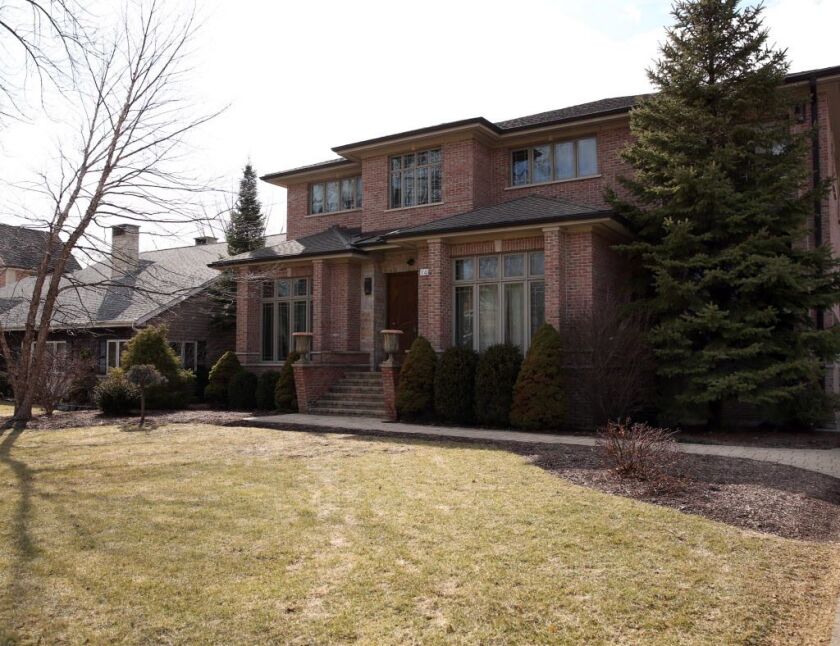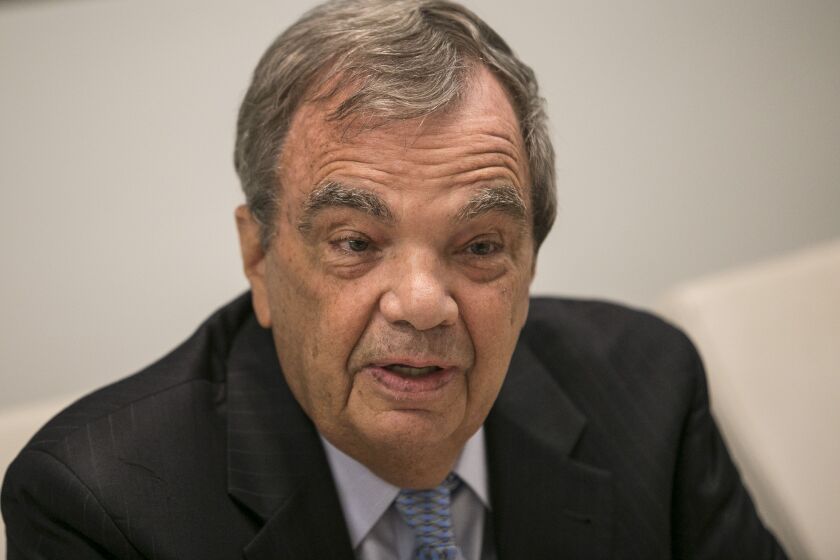A century-old Bridgeport bank that federal regulators shut down last December — less than two weeks after its president was found hanged in a customer’s home — had been involved in a massive fraud scheme that topped $82.6 million, a federal audit has found.
That’s about 30 percent more than what authorities estimated when they closed the clout-heavy bank.
The audit by the U.S. Treasury Department’s inspector general makes clear that federal authorities believe officials at Washington Federal Bank for Savings engaged in a massive fraud, issuing residential and commercial loans that have never been repaid.
And the audit says federal regulators are partly responsible for the losses because they treated Washington Federal “as a ‘training’ or ‘practice’ bank” for rookie examiners who failed to detect the scheme, ignoring “red flags” and being hoodwinked by bank officials including president John F. Gembara since at least 2011.
Gembara, 56, the grandson of the bank’s founder, was found dead last Dec. 3, sitting in a chair with a rope around his neck inside the Park Ridge bedroom of a bank customer who owed the bank nearly $1.8 million and was facing foreclosure. It was 25 miles from his home in Palos Hills.
Gembara’s death has been ruled a suicide by Park Ridge police and the Cook County medical examiner’s office.
The bank’s failure is under investigation by the FBI and by the Federal Deposit Insurance Corp., a federal agency that regulates financial institutions.
The FDIC is trying to collect the unpaid loans, which include as much as $27 million it’s seeking from Robert M. Kowalski, an attorney and developer who has been locked up for days at the Metropolitan Correctional Center in the Loop for failing to turn over records to the FDIC as part of his bankruptcy case.
Criminal defense attorneys have been retained by the former bank board members — Gembara’s sister Janice M. Weston; George F. Kozdemba, a retired electrical technician for the Metropolitan Water Reclamation District of Greater Chicago; William M. Mahon, a deputy commissioner for the Chicago Department of Streets and Sanitation; and Leonard Stepien, comptroller of a packing company. None returned messages seeking comment.
Gembara’s wife Therese Gembara also has hired an attorney, Luke Casson, who told the Chicago Sun-Times earlier this year that the widow doesn’t believe her husband killed himself. Kowalski also previously told the newspaper he thinks somebody killed the bank president.
The federal audit issued this week doesn’t mention Gembara’s death. It also doesn’t identify any of the bank officials.
But it does highlight a series of conflicts of interest involving bank officials and board members who approved loans and then had oversight of the loans they had made.
Washington Federal had made loans to residential and commercial customers without appraising the value of the property until a week to six months after the loans were made, the audit found.
That’s among numerous “red flags” overlooked by inexperienced bank examiners for the federal Office of the Comptroller of the Currency, which assumed regulatory authority over the bank in 2011.
“We identified weaknesses in the execution of the OCC’s supervision of the bank that led to missed opportunities for timely enforcement actions related to the bank’s loan portfolio,” the audit says. “We believe that had the OCC examination teams identified and addressed these issues timely, the fraud at Washington Federal may have been uncovered sooner and the loss to the [deposit insurance fund] and individual account holders may have been reduced.”
The OCC discovered the fraud — as well as the shoddy oversight by the OCC bank examiners — last fall.
It’s unclear what prompted the OCC to conduct that audit. Casson previously told the Sun-Times it was the result of a tip from someone inside the bank.
The OCC turned its findings over to the FDIC, which moved to shut down the bank.
Gembara apparently was aware of that action several days before he died.
Washington Federal was one of eight banks in the United States that failed in 2017, according to the FDIC, which says losses are covered by banks nationwide.
Since the Chicago bank’s forced closing, its deposits have been assumed by Royal Savings Bank, which took over Washington Federal’s main office at 2869 S. Archer Ave. and its lone branch at 1410 W. Taylor St. in Little Italy.
During the examination last fall, the bank examiners looked at a sample of nine loans and were told by bank officials that five of the loans had been paid off.
“They requested additional information about the paid-off loans, but had difficulty obtaining information from the bank,” the report says. An OCC official “instructed the [examiner in charge] to inform the bank’s president that the examiners would not leave the bank until the bank provided the requested information.”
“In November 2017, OCC examiners met with the bank’s Board of Directors to convey significant concerns identified during the examination, including the failure of the bank to provide requested documents and loan files. After the meeting, a member of the bank’s management, who was also a board member, advised OCC examiners that there was a major fraud occurring at the bank. [The assistant deputy comptroller] told us that if previous examiners would have validated that the loans the bank reported as paid-off were indeed paid-off, the fraud would have been uncovered sooner.”
“We believe that the use of insufficiently supervised inexperienced examiners significantly contributed to the failure of OCC to timely identify Washington Federal’s deficiencies,” the audit says.
During those earlier examinations, the OCC employees failed to challenge the bank to produce records to show that loans had actually been repaid, the report says: “An examiner told us that they trust that a bank is giving them a complete and accurate loan trial balance and accept the loan trial balance in good faith unless there is reason to question it.”
The auditors said they had to manually audit Washington Federal’s records because the bank’s computerized management information system couldn’t produce records such as a report on loans that had been extended or renewed or even “a report detailing the volume of investor-owned real estate and owner-occupied 1-4 family mortgages.”
Washington Federal specialized in residential loans, often to customers like Kowalski who bought homes they would lease to tenants who had federal housing vouchers.
Shortly before Gembara’s death, the bank lent $80,000 to the 11th Ward Regular Democratic Organization that’s headed by Cook County Commissioner John Daley and Ald. Patrick Daley Thompson (11th), Daley’s nephew. The money was to repair and rehabilitate the political organization’s building at 3659 S. Halsted St., the alderman told the Sun-Times earlier this year.
The bank had longstanding political connections in Bridgeport. Mahon, one of the board members, has a family connection to Patrick Huels, the former 11th Ward alderman who resigned after taking a loan from Michael Tadin, a trucking kingpin who has made a fortune working for City Hall. Mahon lives a block from John Daley in a three-story home built with loans from Washington Federal.
Mahon started working at City Hall in 1989, running festivals for Mayor Richard M. Daley, according to his LinkedIn profile. As a high-ranking Streets and San official, Mahon has been part of a team that fulfilled Mayor Rahm Emanuel’s plan to create a grid-based system to collect residential garbage, ending the old ward-by-ward system that existed for generations.
The FDIC is suing Washington Federal’s outside accountants, Bansley & Kiener, a clout-heavy Rosemont firm that has done a lot of work for City Hall. The firm has audited every one of the tax-increment financing districts created by Daley, as well as Taste of Chicago.
Bansley & Kiener has contributed roughly $20,000 over the years to the campaign funds of Daley family members, including $600 to their 11th Ward organization in March 2017 and another $600 in October 2017, and it gave $300 to Thompson in June, records show.
The agency has subpoenaed Washington Federal records from Bansley & Kiener, but the accounting firm has refused to surrender them, arguing that the subpoena is “overly broad and burdensome” and seeks records the firm believes are confidential.
But the FDIC says in its lawsuit: “Bansley & Kiener lacks any authority for its position that it can audit federally insured financial institutions and then withhold any record of its audit work. B&K certified only months prior to the bank’s failure that its assets were free of material misstatement. Yet nearly half of the assets of the bank were written off as worthless under six months later.”
The audit also criticizes Bansley & Kiener, saying the firm did yearly audits of Washington Federal between 2011 and 2016 “and never reported any issues with the bank’s loan trial balance.”
Robert Hannigan, the accounting firm’s managing partner, didn’t return messages seeking comment.
Correction: This story has been updated to correct William Mahon’s relationship with former Ald. Patrick Huels. Mahon’s sister is married to Huels’ first cousin.
READ MORE
• Why did Bridgeport bank president kill himself in customer’s Park Ridge home? March 4, 2018
• After Bridgeport banker kills himself, top debtor tries to avoid repaying $20M, April 8, 2018
Treasury Department Audit of Washington Federal Bank for Savings (OIG-19-009)… Nov. 6, 2018 by The Watchdogs on Scribd











